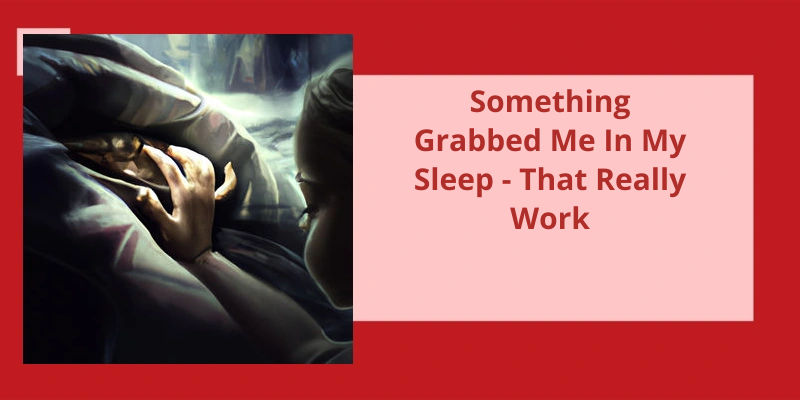Have you ever experienced the chilling sensation of being grabbed in your sleep? It's a terrifying occurrence that can leave you feeling vulnerable and fearful. But fear not, because in this article, we will explore effective methods and strategies to combat this disturbing phenomenon. Whether you’re a victim of sleep paralysis, nightmares, or other sleep-related disturbances, we've got you covered. Prepare to discover practical techniques that truly work, enabling you to reclaim your peaceful slumber and break free from the grip of those haunting experiences. So, if you're ready to unravel the mysteries behind being grabbed in your sleep and regain control of your nocturnal adventures, then keep reading to unlock a world of sleep solutions.
How Do I Get Out of Sleep Paralysis?
Sleep paralysis is a terrifying phenomenon that can leave individuals feeling trapped and helpless. While there are no proven therapies to completely stop a sleep paralysis episode, many who experience it regularly have found techniques that help alleviate the distress. One common approach is to focus on making small body movements. By deliberately trying to move a single finger, then another, individuals may find that they can gradually regain control over their bodies. This method seems to aid in breaking free from the paralysis and restoring normal bodily functioning.
Another technique that some individuals find helpful in overcoming sleep paralysis is focused breathing. By concentrating on deep, slow breaths, individuals may feel a sense of calm and regain control over their bodies. This technique can be particularly effective as it helps to divert attention away from the terrifying hallucinations that often accompany sleep paralysis.
Additionally, practicing good sleep hygiene may help to reduce the occurrence of sleep paralysis episodes. Regular sleep patterns, maintaining a comfortable sleeping environment, and avoiding stimulants like caffeine and nicotine before bed can all contribute to more restful sleep. By addressing any underlying sleep disorders or disturbances, individuals may experience fewer instances of sleep paralysis.
These practices can help individuals develop a sense of control over their bodies and provide them with tools to calm their minds during episodes. By incorporating these techniques into their daily routines, individuals may find that their reaction to sleep paralysis becomes less intense over time.
It’s important to note that while these techniques have been reported as helpful by many individuals, their effectiveness may vary from person to person. It’s always a good idea to consult with a healthcare professional or sleep specialist for personalized advice and guidance on managing sleep paralysis.
Exploring the Causes of Sleep Paralysis: This Topic Could Provide Readers With an Understanding of the Various Factors That Contribute to Sleep Paralysis, Such as Sleep Disorders, Stress, and Genetics.
Sleep paralysis is a phenomenon that occurs when a person feels unable to move or speak while falling asleep or waking up. There are several possible causes for this experience. One common cause is sleep disorders, such as narcolepsy or insomnia, which can disrupt the normal sleep cycle and lead to sleep paralysis. Stress and anxiety are also known to increase the likelihood of experiencing sleep paralysis. In some cases, sleep paralysis may be linked to genetics, as it tends to run in families. Understanding the causes of sleep paralysis can help individuals manage and potentially prevent this unsettling sleep phenomenon.
Conclusion
In conclusion, the experience of feeling something grabbing you in your sleep is undoubtedly terrifying and can leave one feeling vulnerable and anxious. While there may be various explanations for this phenomena such as sleep paralysis, vivid dreams, or even psychological factors, it’s important to acknowledge that these occurrences can greatly impact our well-being and quality of sleep. Rather than resorting to superstitions or paranormal beliefs, it’s recommended to explore common-sense approaches and practical solutions that can alleviate the fear and promote a sense of safety during sleep. Creating a comfortable sleep environment, practicing relaxation techniques, maintaining a healthy sleep routine, and seeking professional help if necessary are all measures that can effectively address and resolve the occurrence of feeling something grabbing you in your sleep. By taking proactive steps, individuals can regain control over their sleep experiences, promote restful nights, and ultimately enhance their overall physical and mental well-being.






